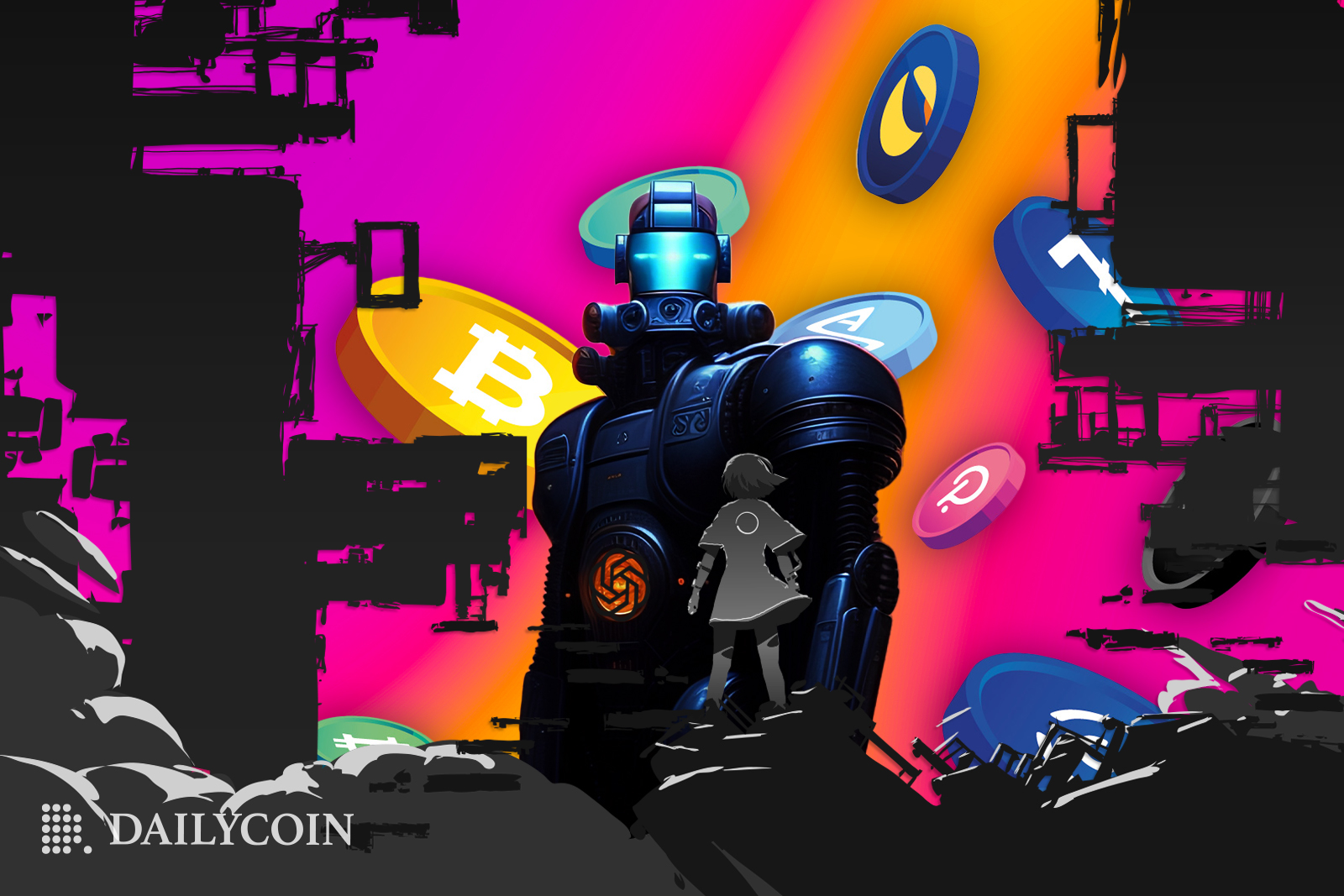
ChatGPT and the growth of artificial intelligence have been the biggest story of 2013. Since it first went live in November 2023, ChatGPT has amassed over 100 million users, making it the fastest-growing application in history. The excitement has also overflowed into the cryptocurrency market, where AI coins like Fetch.ai (FET) and SingularityNET (AGIX) have enjoyed second-hand hype as traders look to take advantage of the exploding narrative.
While ChatGPT isn’t the first AI tool, it is undoubtedly the most widely adopted machine learning technology we’ve ever seen. Experts are predicting radical changes to how we live and work in both the crypto space and in traditional Web2 circles. However, while ChatGPT is expected to revolutionize modern business in nearly every sector, it has its limitations and critics.
Will this cutting-edge technology replace the existing workforce, or is it just a glorified chatbot? What role will ChatGPT play in the future of Bitcoin (BTC) and blockchain technology?
Sponsored
To better understand how it works, we’ll dive into the machine’s heart to ask the important questions. Who better to say whether or not ChatGPT is friend or foe than hearing it straight from the horse’s mouth?
What Is ChatGPT?
ChatGPT is an online chatbot powered by artificial intelligence and the GPT-3 language model. It was created by OpenAI, a research and development company based in San Francisco. Backed by Microsoft and with a list of co-founders that include Sam Altman and Elon Musk, OpenAI has been catapulted into stardom off the back of AI applications like DALL-E and ChatGPT.
Sponsored
With ChatGPT, users exchange dialogue with a chatbot and receive a conversational, text-based response. If it sounds simple, that’s because it is. What separates ChatGPT from other conversational chatbots is its ability to “answer follow-up questions, admit its mistakes, challenge incorrect premises, and reject inappropriate requests.”
But that’s just the tip of the iceberg. ChatGPT pulls data and information from every corner of the internet to craft its responses. It consumes information like a sponge and adds new knowledge to its databank. If prompted, the chatbot will even add touches of humor and personality.

While calling Bitcoin or any other altcoin like Ethereum or Solana ‘Pretend Money’ is a bit of a stretch, ChatGPT sounds just like an enthusiastic grandparent giving you a Christmas present and telling you to keep it safe.
It sounds almost… human.
How Does ChatGPT Work?
At its fundamental core, ChatGPT is a neural network that has digested an immense amount of information and dialogue. Inspired by and modeled after the human brain, a neural network is a machine learning process that uses independent, interconnected nodes to process data.
By leveraging this neural network and its databank of information, ChatGPT analyzes whatever text input it’s given and generates an appropriate text output.
OpenAI engineers have already trained ChatGPT by feeding it enormous data. It was educated on language models and the nuances of input and output structures, giving the software its conversational tone.
What makes ChatGPT so fascinating is how its deep learning ecosystem absorbs information. The software has already learned from a variety of sources, including social media, internet documents, and textbooks. However, like a person, ChatGPT can comprehend new information that you ‘teach’ it.
For example, the first release of ChatGPT was educated using source material and content from before November 2021. Its knowledge of events after this time is limited. To give you an idea, the software still believes FTX is an operational exchange.

However, if I provide ChatGPT with new information about the last year from reliable sources, it can integrate this new information into later responses.
Whenever someone gives ChatGPT a prompt, the machine generates various possible responses internally. In accordance with its training, knowledge, and wider neural network ChatGPT will select what it considers to be the most accurate response.
Can ChatGPT Help Me with NFT and Crypto Trading?
Unfortunately, ChatGPT can’t make you a legendary crypto trader overnight. To put this theory to the test, I asked ChatGPT if it could suggest a good entry on Cardano based on current market conditions:

As I expected, the machine wouldn’t give me a calculated response. However, ChatGPT did provide me with some standard trading advice that new traders might find helpful, such as studying upcoming developments and partnerships.
The same goes for NFT trading. ChatGPT wouldn’t give me any explicit advice that might sway investment decisions. It was sure to tell me that Cryptopunks were iconic, but admitted that NFTs were a relatively new market and highly speculative.

All the same, I appreciate ChatGPT’s disclaimer at the end of its response, telling me to do my own research.
Will ChatGPT Help Cryptocurrency Adoption?
ChatGPT is a potent tool with a vast spectrum of potential use cases. Let’s explore some of the ways that ChatGPT will help crypto adoption in the long term and some of its possible drawbacks.
ChatGPT Pros
Crypto Education
Let’s face it, the world of blockchain technology and digital assets is complicated. Many newcomers to the crypto industry are discouraged by some of the technical aspects of Web 3. Even basic DeFi concepts like stablecoins can be difficult to understand.
ChatGPT provides a solution. It’s like having a blockchain expert in your browser who interactively answers your questions. You can ask ChatGPT to provide simple analogies and basic definitions for complex topics. This can help onboard people to cryptocurrency and dramatically soften the learning curve.
Blockchain Development
Blockchain developers can delegate simple tasks, like creating basic smart contracts to ChatGPT. This frees up their time to focus on more complex responsibilities. To test this theory, I asked ChatGPT to write a basic smart contract in Solidity, a common ETH programming language:

ChatGPT can also be a basic tool to debug simple code and search for potential security risks. While this is a helpful feature, I’d still be cautious about interacting with any code not properly audited by a professional blockchain security firm.
Some crypto traders have even used ChatGPT to help them write their own trading bots that automate buys and sells based on data-driven signals.
Support Crypto Startups
Despite what you may believe, not all crypto startups have millions of USD from angel investors and venture capitalists. Some of the largest blockchain apps, like Uniswap, began as small ideas from individual developers without funding.
ChatGPT can help emerging projects create content, like tweets and documentation, without paying costly social media managers and copywriters.
ChatGPT Cons
Inaccurate Information
As mentioned earlier, the free version of ChatGPT was trained on data and world events from before 2022. Unless you’ve provided it with relevant and updated information, there’s a risk that ChatGPT might share incorrect information.
Moreover, the modern internet is plagued with fake news and unverified sources. So even when feeding information to ChatGPT, you need to do your due diligence and fact-check the sources you’re providing.
ChatGPT is also a centralized tool that can give potentially biased responses. For example, if OpenAI was bearish on XRP and fed ChatGPT negative information about Ripple, the software might give only negative responses about that particular crypto. While this is not necessarily the case, it’s always possible within centralized environments.
Security Concerns
ChatGPT developers store all the data and information shared with the software as part of the terms of use. This is used to improve the product and expand its knowledge. However, knowing how this information might be used behind the scenes and who will have access to it is hard.
To be safe, I’d recommend not sharing personal details or credit card numbers with ChatGPT.
Human Complacency
While this isn’t a ChatGPT-specific drawback, it almost merits an entire discussion of its own. Just because we can automate and delegate simple tasks to machines doesn’t mean we should. If everyone opts for a simple solution, human creativity and critical thinking will become obsolete.
Artificial intelligence as a whole is already making certain professions redundant. From a business perspective, it makes sense; why pay an artist to create branding images if an AI like DALL-E can accomplish a similar task for free? Why hire a copywriter when ChatGPT prepares similar content at higher levels of productivity?
If AI can outperform humans in the workforce, what happens next?

Is this really the future we want?
What Does ChatGPT Itself Think About All This?
ChatGPT is designed to absorb information and provide accurate responses to prompts. I asked ChatGPT to read this article, then waited for its comments:

For now, ChatGPT sees itself as a tool for the benefit of humanity. How it’s used and for what purposes is up to us. The program shouldn’t be able to lie, so I have no reason to believe that ChatGPT itself is out to replace us.
Yet.
On The Flipside
- ChatGPT and artificial intelligence in general are nascent technologies. We are still in the very early days of AI development, so while ChatGPT is undoubtedly a powerful tool, its capabilities still have some limitations.
Why You Should Care
The rise of ChatGPT and artificial technology is expected to change how modern businesses and livelihoods operate in the near future. AI’s newfound popularity has exploded in the cryptocurrency market, with AI-based cryptos witnessing significant price movements.
It’s important to understand how this technology works and its limits. This will help you make informed decisions in the crypto market and stay educated on how AI can be used in the future.
FAQs
ChatGPT is a conversational chatbot that generates text outputs. It can answer questions and explain complicated concepts. It can create written content like emails and social media posts.
ChatGPT was created by OpenAI, a research and development firm based in San Francisco. Open AI was co-founded by industry experts, including Sam Altman and Elon Musk.
ChatGPT is a powerful tool, but it still has its limitations. ChatGPT can only generate text-based outputs and is reported to have difficulty understanding sarcasm and irony. Some users have said that the machine lacks common sense and general knowledge.
GPT is an abbreviation of Generative Pre-training Transformer. That means the software generates a response based on pre-trained knowledge that its underlying AI model transforms.
No, ChatGPT will not beat Google. While ChatGPT generates text, Google is a search engine that helps users find images, videos, and goods online. ChatGPT and Google have similarities, but they are not direct competitors.

